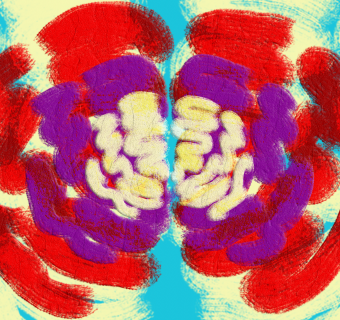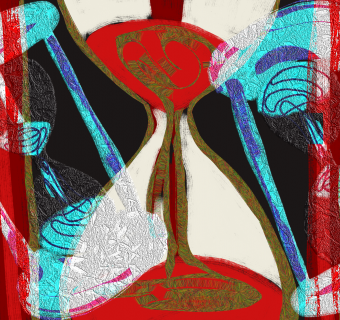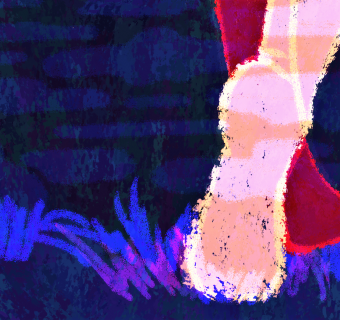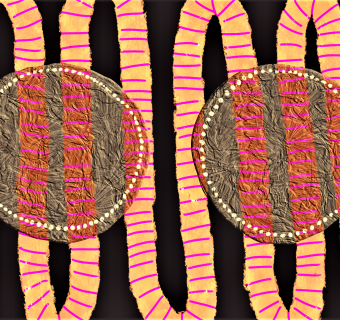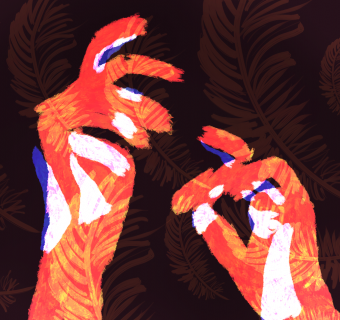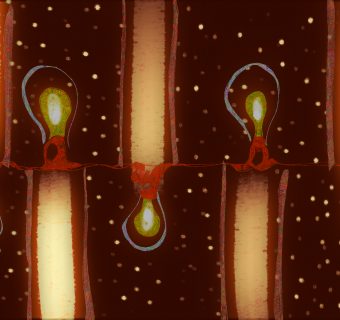There are times in life when I know exactly where I’m going. Such times are blissful, yet rare as a four-leaf clover. Far more often, the path ahead is uncertain. It leads to an unknown destination, and I have no map or directions. Lately, as I attempt to navigate constant change on personal, professional, and political levels, I have found myself searching for some sort of reassurance that I’ll eventually find my four-leaf clover.
Time and time again, it is the women in my community who step in to lend such guidance when I need it most. One of these women is Chanel Craft Tanner: educator, author, and director of the University of Virginia’s Maxine Platzer Lynn Women’s Center.
As Tanner says, “The women know the answer. The backbone of most movements are the women, and the backbone of most families are the women.” For me, my backbone is made up of my mom, my aunt, and my grandmothers. I know many others who lean on the women in their lives for support, but some might not have grandmothers to call or a mother to turn to. In that case, there will always be women in the community to fill in this role. Women like Tanner, who have an abundance of wisdom to share and a desire to share it, also make up the backbone in my own community. I had the opportunity to discuss with her the importance of rest, community, and historical knowledge, and how such resources can help us find a way forward through uncertainty.
(This interview has been edited for length and clarity.)
Middleton: How do you take care of yourself during uncertain times?
Tanner: Honestly, being a Black woman in America, it's always uncertain times. I feel like I was born into uncertain times. There may be periods where there is some steadiness, but, overall, it's been uncertain.
For me, yeah, these are uncertain times, but I've always had to live in uncertain times. I grew up very poor in a very poor neighborhood in Brooklyn, New York, before moving into a rural part of Virginia in Danville. Whether or not the bills were going to be paid was uncertain. And so…how do you live in that uncertainty?
Having practices that pull me back to the present, like meditation, has helped. In this moment, as I'm thinking about things that maybe I don't want to be thinking about or I'm anxious about something, I pull myself back to my center.
The real question is, well, what is my center? In this moment, it really has been community. When the world feels too heavy, what I do is focus on my house, focus on myself, focus on my friends, focus on my community.
Middleton: While navigating a stressful atmosphere, especially in times of increased stress. How do you prioritize rest in your daily life?
Tanner: I do believe that rest is resistance.
Some people believe "I am my ancestor’s wildest dreams," when they are thinking about their career advancements and earning degrees. However, there are those of us who believe that, actually, my ancestors were probably dreaming about being able to rest in the middle of the day. So, it is quite revolutionary to be able to do that.
I believe, sincerely, that it's okay to rest. I also understand that a lot of this uncertainty and things that are designed to crush our spirits also are designed to make us think we can't rest, and that we can't find joy. So joy and rest kind of go hand in hand. Know that resting is a part of the fight, because resting means we're human. Resting means we're alive.
I struggle with rest, though. It's one of the things that I struggle the most with. It's a daily practice to make myself rest. But what has helped me is thinking about it from a political lens, thinking about folks who have come before me who fought really hard for rest.
Middleton: What types of support are helpful for you from your community, and how do you give back that support to those who are in your community?
Tanner: When you're in a community, you get real intentional about the issues that affect the lives of the people that are in your community, and those are things that you have the capacity to solve. For instance, I don't know what to do about global warming today, but I do know what to do about getting more litter off of the street in my neighborhood by having trash cans more accessible for the people who are walking. And that is what community gives me: it gives me that opportunity to focus on the immediate. So then, what I give my community is the skills that I have to do that, the time that I have to do that. It's about thinking about what I can do today.
Middleton: As a leader, how do you reassure those who look up to you when you don't feel like you have all the answers, and how do you reassure yourself?
Tanner: Honestly, it's being transparent and vulnerable, and being honest with my team. When I don't know the answers, I share what I know as best as I can share it. When I'm afraid, I say, “y'all, I'm afraid.” And when I'm hopeful, I'm saying, “I'm hopeful in this moment. I think we can do this.” What I found is that when I'm vulnerable, then they also can be vulnerable. And the most beautiful thing that happens is that, as a leader, I feel really cared for by my team, because I'm saying when I need care. It's usually in those moments that someone can give me the hope that I need, and next week it might be that I'm giving them the hope that they need.
Middleton: What does it mean to you to be resilient? Do you have any suggestions for how others can practice resiliency during especially difficult times?
Tanner: It's a tricky question as a Black woman, because I'm thinking about particular tropes that we are meant to be so strong all the time. To hold it all down all the time. Resiliency can also break us. It can kill us in its own right. And so, I'm not always trying to be resilient anymore, not on an individual level. What I'm focused on instead is building resilient networks, resilient communities, a resilient family, resilient team, so that when I have to tap out, other people can tap in.
I heard of this metaphor about how in a choir, when they sing, everyone doesn't take a breath at the same time. They kind of time it so someone takes a breath while others sing. You stop to breathe, and then you come back in, and then somebody else can take their breath. That's how I think about resiliency. It's knowing who you can count on and who can count on you, so you can take a breath. I think we're in need of a different type of resiliency in this time. Individualism is not going to be a thing that saves us. Audre Lorde says the master's tools will never dismantle the master's house, and that idea that we are individuals is a master's tool. I don't ascribe to that, I don't want that. I’d rather build resiliency across community.
Middleton: How do you stay committed to your work when facing roadblocks? When you feel like you're experiencing setbacks more than forward motion, how do you stay committed to the work that you value?
Tanner: I think setbacks are just a part of it. Know you have an end goal in mind, but it's not something that happens instantaneously. If we understand that the work that we're doing is slow work, then that helps us stay committed. I also look at what's in front of me at the moment. There's a lot that suggests things may be dark. But I look at the light. I look at the fact that today I get to sit down and talk to a student who is working for an amazing student magazine that's been around since the 80s. And how cool is that, that that still is there, and that Iris as a team gets to exist and experience the collectivity that I'm talking about? Y'all get to do that every week and build something and make something in this world.
So, I can spend all my time on the fear, or I could just focus on what is in front of me, and there's still so much amazing stuff happening every day in the work that I do. It's remembering the history, and remembering how far we've actually come.
Middleton: Do you have tips for how to continue forward when you don't know exactly where to go, when the path isn’t clear, or you feel like you are losing hope?
Tanner: The old folks used to say, "there's nothing new under the sun." That's a methodology for me, and one that I would give as a tip: remember that it's nothing new under the sun. Therefore, go back to go forward. You have to go back and go get the lessons that were behind us. That is the sankofa tradition.* You got to go back and get it.
Growing up poor, we were always recycling bags. We always kept our, glass peanut butter jars and turned them into cups. Like, this isn't new. It's trendy now. But, we were already doing that. We were already taking old T-shirts and cutting them up and turning them into rags. So that is a reminder. You gotta go back and get it.
Some of it is going back into our history books, and some of it is going back and talking to your moms and your grandmothers and your great aunts. The oldest women in your family or community, go sit at their feet and ask them, "How did you do it? What did y'all do? How did you survive those times?"
That's the biggest tip I would give. When things are uncertain, go to history. It's nothing new under the sun.
*As defined by the Witness Tree Institute of Ghana,“ ‘Sankofa’ ” is an Akan Adinkra symbol which depicts a bird with its head turned backward retrieving an egg from its back. The symbol expresses the importance of reaching back to knowledge gained in the past and bringing it into the present to make positive progress.”




